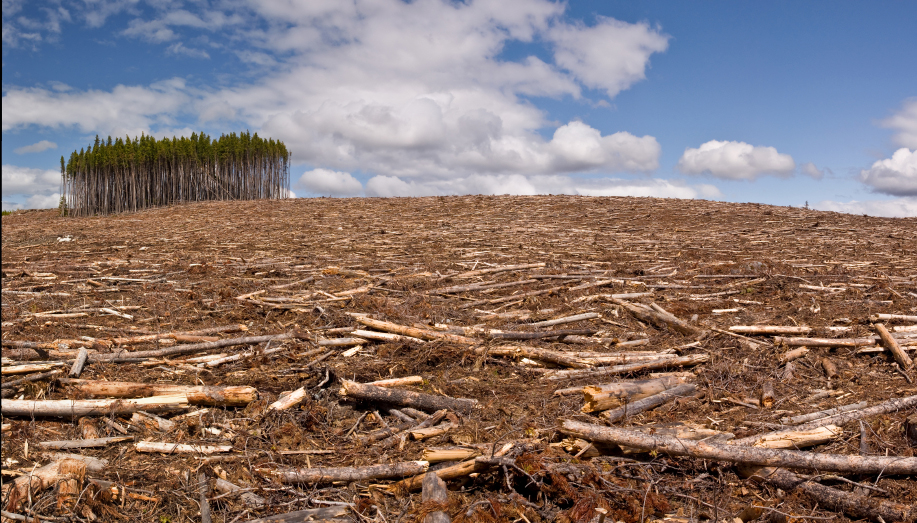11 Dec 2024

Tired Earth
By The Editorial Board

According to the U.N. Food and Agriculture Organization, forests cover 31 percent of the Earth's surface, roughly 10 billion acres. Deforestation occurs primarily from human activities, such as agriculture, logging and wildfires. The highest rate of deforestation occurred in the 1990s, when each year, the world lost an average 40 million acres of forest. Forest expansion through planting and natural processes, however, brought the annual net loss of forests in the 1990s down to 21 million acres per year. Deforestation rates declined from 2000 through 2010 but losses still exceeded expansion. The global net loss for forests between 2000 and 2010 was 13 million acres per year.
Habitat Destruction
Agriculture is the number one cause of deforestation, followed by logging and wildfires. Logging trees for wood products or fuel provides economic benefits to communities but also removes shelter and food for plants and animals that depend on forests for their survival. Fires may help certain fire-dependent forest communities regenerate, but man-made wildfires far exceed the rate of natural fires causing further habitat loss. It is estimated that over 80 percent of forest fires are caused by human activities. Some animal species may thrive on new vegetative growth after a fire, but others require a mature forest canopy to survive. Animals such lemurs, spider monkeys, sloths, toucans, orangutans and parrots spend most of their time high in rainforest canopies where their food sources are, and rarely visit the forest floor. The world is losing about 80,000 acres of rainforest daily, and along with that, some 50,000 plant and animal species per year.
Economic Impacts
Over 1.6 billion people depend on forests for their livelihoods. Forests provide wood for buildings and furniture, paper and a place for recreation. People in rural areas of the world depend on forests for access to fuel, food, water and medicine. It is critical that forests be managed for sustainability. Communities that want to clear forest land for agriculture need to carefully consider the costs and benefits. Certain soils, such as the acidic, nutrient-deficient soils of rainforests, are not suitable to agriculture. Slash and burn techniques are often used to clear rainforest land -- the trees are cut and the area burned to release nutrients locked up in vegetation. This helps produce a layer of rich material above the characteristically poor forest soil. The land may be productive for a few years, but will eventually lose its nutrients and require fertilization. Fertilizers may be washed into rivers and streams, affecting fish and wildlife. Even in areas where forested land is suitable to agriculture, replacing forests with monoculture crop or tree farms opens up the economic risk of failure from weather, diseases or pests.
Soil Quality
Deforestation causes soil erosion from the absence of vegetation, decreased ground debris and fewer roots to hold the soils together. Soils become more vulnerable to runoff from rainfall and nutrient content is degraded. Loose soils on slopes may result in landslides. In open areas, soils become more arid from exposure to the sun. It is estimated that one-third of the world's arable land has been lost due to soil erosion and other types of degradation since 1960. The loss rate of arable lands continues at about 25 million acres per year. This has a negative effect on local economies. When land can no longer be farmed, people move on to more productive land, which may also be degraded.
Water Quality
Many people do not realize that forests process drinking water for millions of people. Clean water comes from precipitation that is filtered through forests before entering streams, lakes and aquifers. Forests help keep soils porous, enabling the removal of pollutants, nutrients and sediments before they enter water systems. Water purification by forests provides economic and public health benefits to communities. A study conducted by the American Water Works Association and the Trust for Public Land found that drinking water treatment costs decreased as the amount of forest cover in watershed areas increased. The study concluded that 50 to 55 percent of the variation in operating treatment costs could be explained by the percentage of forest cover within the water source area.
Air Quality
Forests help keep the air pure by taking in carbon dioxide (CO2) and releasing oxygen for us to breath in the process of photosynthesis. Trees also filter a variety of gaseous pollutants from the air including ozone, nitrogen oxides and sulfur dioxide. A study released by the Center for Chesapeake Communities and Pinchot Institute for Conservation found that trees in Washington, D.C. remove over 8.3 million pounds of nitrogen dioxide from the air each year, equivalent to removing over 274,000 cars off the road. This benefit equates to an annual savings of $51 million of associated pollution costs, such as health care for the district. Health problems that trees help mitigate by removing pollutants include heart and lung disease and asthma.
Climate
Global warming is the result of greenhouse gases being released into the atmosphere in the combustion of fossil fuels and by deforestation. It is estimated that 17 percent of carbon dioxide emissions are from deforestation and the decay in peat soils. Plant biomass, including woody biomass, is an important renewable resource that can be used to provide heat and fuel, but unless managed properly and sustainably, biomass resources can also add more greenhouse gases to the atmosphere than they absorb. Maintaining the Earth's stable average temperatures requires that sources of added carbon to the atmosphere be in equilibrium with the carbon sinks that remove carbon from the atmosphere. Forests are important carbon storage reservoirs. Many scientists recommend protecting and increasing forested land and managing forests for sustainability as a strategy for mitigating global warming.
Source:oureverydaylife.com
Comment